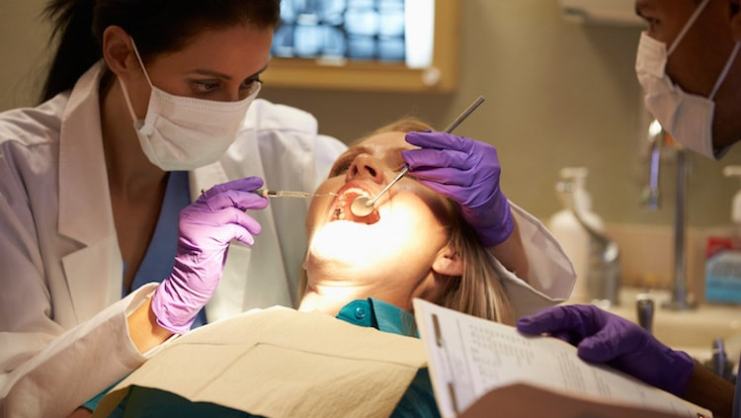University logo:

Program name: Doctor of Dental Medicine
University name: European University
Faculty: Medicine
Program supervisor: Sophio Samkharadze – MD, PhD, Associate Professor
Web-page: https://eu.edu.ge/
University address: Guramishvili Ave. 76, Tbilisi 0141, Georgia
Representative email: enroll@orientcities.com
Dentistry Program Overview
Educational program in dentistry consists of:
- Components of the major field of study – 270 credits, among them:
- Compulsory components of the major field of study – 258 credits;
- Elective components of the major field of study – 12 credits.
- Free components – 30 credits, among them:
- Free components – 20 credits, which is oriented on the development of general/transferable competencies;
- Free components – 10 credits, which can be collected by a student by choosing any study course from a university education program of the same level by considering admission preconditions of the study course.
Educational Program in Dentistry Can Be Divided Into Three Parts:
Part I – Human Body Structure and Function (I-II years)
The basics of general medicine include basic concepts about the structure and function of the human
body and biomedical sciences. During the first two years, students will learn about the structure of the
human body, life sciences and research principles in the field, clinical and professional skills
(communication and procedural skills, medical ethics), and the basics of public health. The teaching of
these integrated modules will be carried out using different teaching methods (lectures, role-playing
games, practical work, work in a simulation laboratory, etc.). Students will master key practical skills
(working on phantoms) in the phantom class. Through simulation teaching, students will gain
knowledge-based experience; Students will also study regional anatomy through virtual dissection on
mannequins and discussion of specific clinical cases. Besides, from the very first year, students will be
involved in a problem-based learning course (PBL) that will be long-lasting. At the end of the specialty
phantom courses, students take an integrated exam (MCQ and OSCE).
Part II – Mechanisms of Health and Illness (III-IV course)
Attention is paid to the clinical part (propaedeutic and clinical skills). This part is mainly focused on
the most common symptoms and signs of the disease. At the same time, students improve their practical
skills. During the III year, students learn diagnostic thinking by discussing cases in different medical
fields, which in turn helps to integrate the acquired knowledge and prepares students to fully
understand the clinical subjects, most of which is offered in the program from IV years. During the IV
year, students study the main dental and clinical subjects in the form of clinical rotations – dermatology,
pediatrics, otorhinolaryngology, etc. These modules are taught in both outpatient and clinical settings.
The most important part is the inclusion of clinical courses of the major field of study, during which
the students continue to master the clinical skills and symptoms of dental diseases. At the end of
most study courses, students take an integrated exam (MCQ and OSCE).
Part III – Clinical Courses in Dentistry (V Course)
The third part is the continuation of clinical courses in the major field of study (Conservative, Surgical
and Orthopedic Dentistry, Pediatric Dentistry and Pediatric Surgery, Orthodontics), during which
students continue to study professional skills. During the V year, students will have additional clinical
activities to strengthen and refine their competencies in the major field of study. At the end of some
rotations, students take an integrated test. Within the same year, students are given a variety of clinical
assignments, the completion of which prepares graduate students for future specialization and
postgraduate residency programs.
The Aim of the Dentistry Program
The program aims to train a professional dentist under modern international standards, who: Possesses
the theoretical knowledge and practical skills required for professional activities (1), who qualitatively
uses research, ethical and communication skills (2), develops professionally in an ever-changing
environment (3).
Learning Outcomes of the Dentistry Program
- Describes the systems of the human body, its essential elements, tissues, their interconnections, developmental features, and functions; Explains the anatomical, physiological features of the body and the biochemical processes taking place in the living organism; Discusses the organism as an integrated system. Recognizes and characterizes cases of norm and pathology, identifies causes of pathologies. Lists the preventive measures and understands the necessity and importance of their implementation.
- Identifies the construction of dental equipment, rules of operation, and management. Lists the purpose of the dental instruments and medical and dental materials, methods of their application. Chooses the methods of aseptic and antiseptic, explains their importance in maintaining sanitary and hygienic standards. Conducts the waste management/utilization procedures.
- Explains the etiology and pathogenesis of tooth soft and hard tissue diseases. Formulates a diagnosis, including differential diagnoses. As a result selects and implements modern and adequate diagnostic, prophylaxis and treatment methods, according to the patient’s age and needs.
- Interprets periodontal tissue and oral mucosa diseases, defines their diagnoses, including differential diagnosis. Evaluates selects and implements the modern methods of diagnosis prevention and treatment.
- Compares maxillofacial region odontogenic and non-odontogenic inflammation, neoplastic changes, and traumatic injuries. Justifies conservative, surgical, reconstructive, or restorative treatment needs.
- Categories diseases of oral surgery. Determines traumatic injuries of the oral cavity. Chooses appropriate treatment methods depending on etiology and pathogenesis, diagnoses, and differential diagnosis.
- Interprets and describes anomalies of the jaws, determines etiological factors, differentiates them, and makes the diagnoses. Based on the attained data chooses the correct orthodontic treatment tactics and the appropriate appliances.
- Compares and differentiates various orthopedic diseases according to etiology, pathogenesis, degree, and type of damage. Demonstrates diagnostic procedures and consequently chooses appropriate treatment methods.
- Chooses the types and application methods of local and general anesthesia. Explains possible problems and can cope (govern) with complications of local anesthesia.
- Can gather anamnesis, complete a medical card. Examines patient. Write down the examination data and keep recording; Choose the necessary additional examinations; Analyze and interpret the data of examination, conduct differential diagnosis and determine the diagnosis; Demonstrates basic clinical skills.
- Defines and explains the importance of applying ethical norms and legal regulations in medical practice. Demonstrates verbal and written communication skills on issues related to the field, ability to design research, make detailed planning, process results and conclude; Discusses scientific research methodology;
- Estimates and substantiates the need for further professional development and the need to keep up-to-date with the latest developments in the field.
Areas of Employment and Prospects for Further Education
According to the Georgian current legislation, a graduate of one cycle educational program in
dentistry is allowed to run the independent medical practice after obtaining a state certificate giving
him/her the right mentioned above (The Law of Georgia on Medical Practice, Article 7).
According to the law mentioned above (article 17), a graduate having a higher medical education
have the right to:
- complete postgraduate professional training program to acquire the right to perform an independent medical practice after passing a state certification exam;
- carry out research and teaching activities in the theoretical fields of medicine, or other fields of health care that does not imply an independent medical practice;
- work as a junior doctor (intern).
A graduate of one cycle educational program in dentistry has the right to continue further education on
next level of higher education.
| AVAILABLE SPECIALIZATION | THE DEGREE AWARDED | AMOUNT OF ALLOCATED ECTS | DURATION OF STUDY | THE LANGUAGE OF STUDY | ANNUAL INSTALLMENT |
|---|---|---|---|---|---|
| Dentistry | Doctor of Dental Medicine | 300 ECTS | 5 years, 10 semesters | English | $3 500 USD |
Additional Resources
Register Now!!! Begin Your Journey Towards Becoming a Certified Doctor of Dental Medicine!
Representative email: enroll@orientcities.com
The documents required to obtain admission:
- Copy of the passport;
- School certificate (Equivalent to A level for Undergraduate Applicants / BA degree Diploma (for MA degree applicants) along with transcript;
- Application fee payment receipt.
- Video Interview (Ask us for details of this interview)
- The student’s E-mail address and contact details





